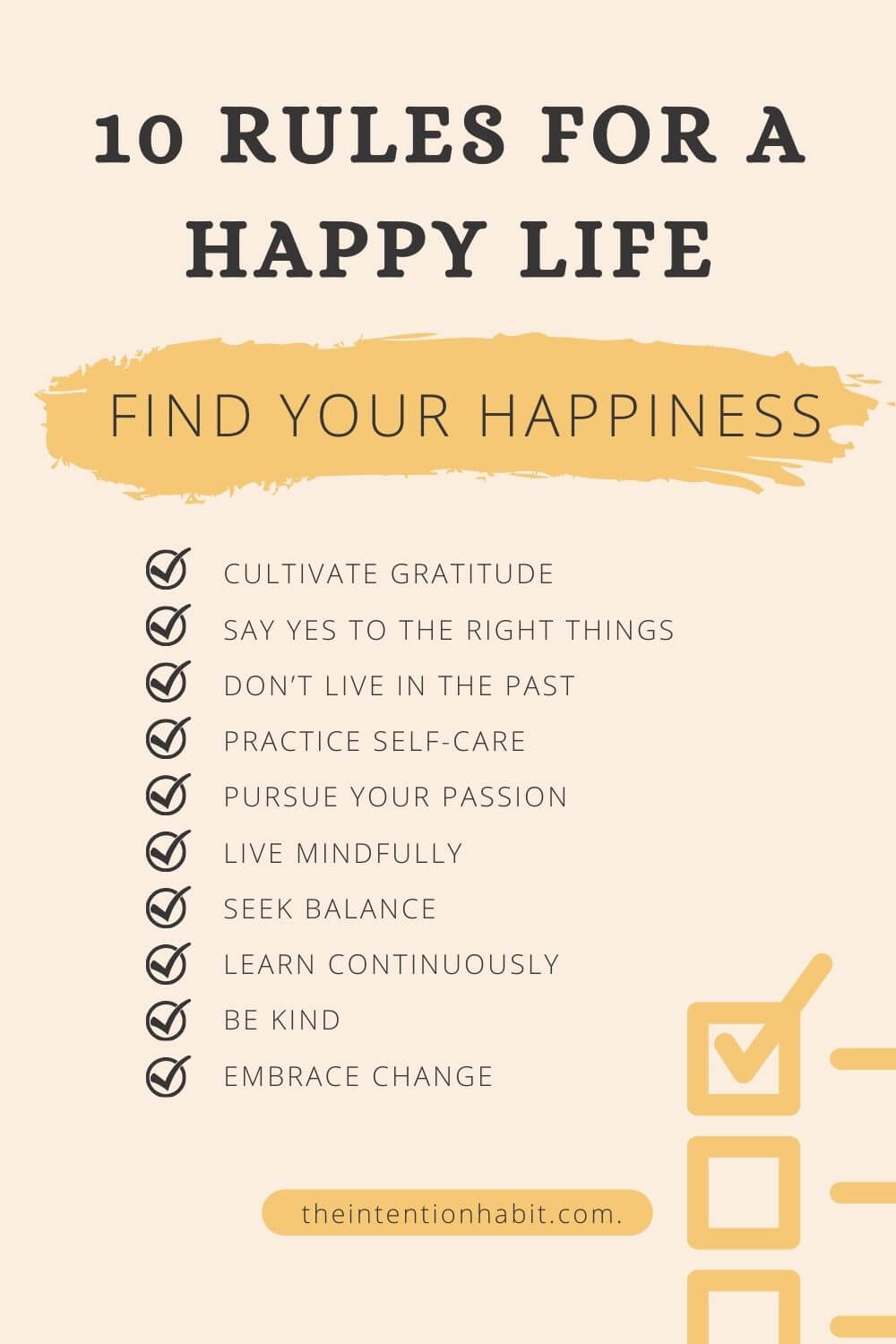10 Rules for a Happy Life: Find Your Happiness
Living a happy life is something that everyone desires. However, the path to true happiness can be elusive. It is not uncommon for people to feel lost, confused, and unfulfilled despite their best efforts. Fortunately, some unofficial rules for a happy life can help you find those key elements that lead a happy and fulfilling life.
The rules of happiness can vary from person to person, but some fundamental principles are universally applicable to each of us human beings Let these guidelines be a starting point for you to create your personalised happiness plan.
10 Essential Rules For A Happy Life
These guiding principles can help individuals find their purpose in life and pursue true happiness.
While they aren’t ‘rules’ in the traditional sense, but more along the lines of guidelines to help you ‘find your happy‘, by following these golden rules, you can step closer to cultivating a positive mindset, building stronger relationships, and finding meaning in your life.
Let’s get to the list of rules for a happier life:
Rule 1: Cultivate Gratitude
The first rule of cultivating gratitude is easily one of the most important rules for leading a happy life.
Being grateful for the good things in life can have a significant impact on your mental health and well-being. It is easy to get caught up in the negatives of daily life, but taking a few moments each day to express gratitude can shift your focus towards the positives.
Having a grateful attitude helps to develop a positive mental attitude so you can focus on the good things in life and reduce symptoms of stress and anxiety.
It is important to note that being grateful does not mean ignoring the challenges in life. Instead, it means acknowledging the good things in life and being thankful for them.
Gratitude plays an important role in daily life. And it has a positive effect on your greater happiness.
It helps to improve relationships, as expressing gratitude towards others can make them feel appreciated and valued. It can also improve self-esteem. Acknowledging your own accomplishments and being grateful for them can boost confidence.
To cultivate gratitude, one option is to start by keeping a gratitude journal. Each day, write down three things that you are grateful for. It can be as simple as being grateful for a warm cup of tea or a good night’s sleep.
My daily gratitude practice includes having a phone reminder pop up asking me ‘What am I excited about today?’ to start my day with a positive and grateful mindset.
Here are some more resources for gratitude:
Rule 2: Say Yes To The Right Things
Living a happy life is all about making conscious decisions that have positive impacts on your life. One of the most important rules for a happy life is learning to say yes to the right things (and learning how to say no to the wrong things).
It’s easy to get stuck in your comfort zone and say no to new experiences, but saying yes can lead to a more meaningful life.
Saying yes to the right things means being open to new experiences and opportunities that can enrich your life. It also means being willing to step out of your comfort zone and take risks.
But beyond this, choosing the things you accept and decline means living with intention and a more intentional life is one closer in line with your true values and desires.
Say no to negative people who drain your energy and bring you down. Say yes to spending time with people who uplift and inspire you. Say no to activities that don’t align with your values or goals. Say yes to trying new things, even if they scare you a little.
To determine what the right things are for you, take some time to reflect on your values, goals, and priorities. Consider what truly brings joy and meaning to your life. This can help guide your decision-making process and ensure that you are saying yes to the things that align with who you are.
Here are some more resources to help you live with intention:

Rule 3: Don’t Live In The Past
It’s natural to reflect on our past and learn from our experiences, but dwelling on the past can prevent us from moving forward and living in the present.
Constantly reliving negative memories or regrets can lead to feelings of sadness and dissatisfaction with our lives. It’s important to acknowledge the past, but also to let go of any negativity associated with it.
We all make mistakes. Sometimes a bad thing will happen. Negative self-talk gets in our head. But greater happiness comes from looking forward.
Instead of dwelling on the past, focus on living in the present moment. This can include practising mindfulness, being grateful for what you have, and finding joy in the little things.
You can’t change what has happened before today, so focus instead on how you can make tomorrow better!
Avoid letting your past toxic relationship ruin a great relationship you have now with romantic partners or family members. And don’t allow that negative energy to become a block for future romantic relationships.
Rule 4: Practice Self-Care
Taking care of yourself is crucial for a happy life. Self-care is all about looking after both your mental and physical health and taking time out to do things that bring joy and inner peace.
Self-care can take many forms, such as getting enough sleep, eating a healthy diet, exercising regularly, and taking breaks when needed.
One of the best ways to practice self-care is to create a routine that works for you. This can include setting aside time for exercise, meditation, or hobbies that bring joy. It can also involve setting boundaries and saying no to things that do not serve your mental or physical health.
Another important aspect of self-care is seeking help when needed. This can include talking to a therapist or seeking support from friends and family. Asking for help is a sign of strength, not weakness – none of us can do it all alone, and we don’t need to!
Here are some ways you can prioritise self-care:
Rule 5: Pursue Your Passion
Pursuing your passion helps you to discover your purpose and live a fulfilling life. When we engage in activities that ignite our passion, we feel energised, motivated, and fulfilled.
Think about what makes you happy and set aside time to do it regularly. This could be a hobby, volunteering, or even turning your passion into a career.
Steven Covey, author of “The 7 Habits of Highly Effective People,” said, “Most people struggle with life balance simply because they haven’t paid the price to decide what is really important to them.”
Once you’ve identified your passions and priorities, make a plan to pursue them. This may involve setting goals, creating a schedule, or finding resources and support.
Here are some ways to help you pursue your passion:
- Set goals that align with your passions
- Surround yourself with like-minded people who support and encourage you
- Take small steps towards your passion each day, no matter how busy you are
It’s never too late to discover or pursue your passion. You deserve to live a life that brings you joy and satisfaction.
Here are some resources to help you find and chase your passions:
Rule 6: Live Mindfully
Living mindfully is an important aspect of leading a fulfilling life. It involves being present in the moment and paying attention to what is happening around you.
Mindfulness requires a conscious effort to focus your full attention on the task at hand, no matter if it is work, exercise or spending time with loved ones.
Mindfulness helps to reduce stress and anxiety, allowing us to be more present in our lives. It also helps to improve mental clarity and focus, which can lead to better decision-making and problem-solving.
Research has found that practising mindfulness regularly can have a positive impact on our overall well-being and life satisfaction. It can also improve emotional reactivity.
One way to practice mindfulness is through meditation. Meditation involves sitting quietly and focusing on your breath, allowing your thoughts to come and go without judgment. Regular meditation can help to improve your overall sense of well-being and reduce stress levels.
But meditation isn’t the only option!
Another way to practice mindfulness is by being more aware of your surroundings. This can involve taking a walk in nature and paying attention to the sights, sounds and smells around you.
Or simply taking a moment to pause and appreciate your surroundings, whether it’s the beauty of a sunset or the warmth of a cup of tea. The feel of grass under your bare feet or sunshine on your skin.
You can incorporate mindfulness into everyday activities such as cooking, cleaning or even brushing your teeth. Pay attention to your movements, senses and thoughts in that moment.
Rule 7: Seek Balance
In today’s fast-paced world, it’s easy to get caught up in the hustle and bustle of everyday life. Finding balance between work life and personal life can be a challenge, but it’s essential for a healthy and joyful life.
One way to achieve balance is by setting clear boundaries. This means knowing when to switch off from work and giving yourself time to recharge. It’s important to take breaks throughout the day and to make sure that you’re not working too many hours.
Another way to find balance is by prioritising your time. This means focusing on the things that matter most to you, such as spending quality time with loved ones or pursuing hobbies and interests.
Work and career is just one part of your life. While we are constantly surrounded by social messaging and opinions that tell us that success is the most important thing, it’s crucial to remember that other aspects of life also require attention and nurturing.
Eating a healthy diet, getting enough sleep, and exercising regularly are also important for maintaining balance. These things help to keep your body and mind in good shape, which can help you to feel more energised and focused throughout the day.
Rule 8: Learn Continuously
Learning is a continuous process that never ends. Successful people understand the importance of learning new skills and knowledge to stay relevant in their professional lives. They make continuous efforts to gain new knowledge and improve their skills to ensure future success.
But learning isn’t just in your professional life!
Learning new skills helps us keep our passions fulfilled and brings new opportunities and excitement into our lives.
From picking up a new hobby to attending workshops and conferences, there are endless ways to continue learning in all areas of our lives.
So don’t be afraid to step out of your comfort zone and try something new. You never know where it might lead you! And remember that even small steps towards learning can make a big difference in achieving balance and happiness in life.
Rule 9: Be Kind
Being kind is a fundamental rule for a happy life – yours and other people’s!
Kindness is contagious, and it can create a ripple effect that spreads positivity and happiness. When people are kind to each other, they build great relationships that are based on mutual respect and understanding.
Happy people are often kind people. They understand that kindness is not only beneficial to others but also to themselves.
When people are kind to others, they feel good about themselves, and this boosts their self-esteem and confidence. They are more likely to attract good people into their lives and establish good relationships.
Kindness is also essential in maintaining good relationships. When people are kind to each other, they are more likely to forgive each other’s mistakes, and this creates a more forgiving and understanding environment.
Kindness can help people overcome conflicts and misunderstandings, and it can create a more peaceful and harmonious relationship.
To be kind, people must be willing to put themselves in other people’s shoes. They must be empathetic and understanding, and they must strive to see the good in others. Being kind also means being patient, tolerant, and respectful towards others.
Don’t forget you must also be kind to yourself!
Rule 10: Embrace Change
Change is an inevitable part of life. It can come in many forms, from big changes like moving to a new city or starting a new job, to small changes like trying a new hobby or meeting new people.
While change can be scary and uncomfortable, it is also an opportunity for positive growth and new experiences.
One of the keys to embracing change is adaptability. Being able to adapt to new situations and challenges is an essential skill for a happy life. It allows individuals to be more resilient and better able to handle unexpected life changes.
When faced with a new opportunity or challenge, it’s important to keep an open mind.
Instead of focusing on the potential risks or downsides, try to see the positive aspects of the change. This can help you feel more excited and optimistic about the future.
In addition to being adaptable, it’s also important to be proactive about seeking out new opportunities for growth and change.
By cultivating a mindset of adaptability and proactive exploration, individuals can live happier, more fulfilling lives.
This can also mean letting go of material possessions that no longer serve you. Some of these come with negative emotions that keep us stuck and letting go of these external things can help us move forward.
These rules for a happy life will help you be more intentional in life and prioritise yourself, your relationships and your pursuit of happiness. Life is a journey full of ups and downs, but by following these happy guidelines, you can navigate through it with more ease and find joy in the process. Keep an open mind, stay curious, and never stop learning and growing. Cheers to a happy life!








